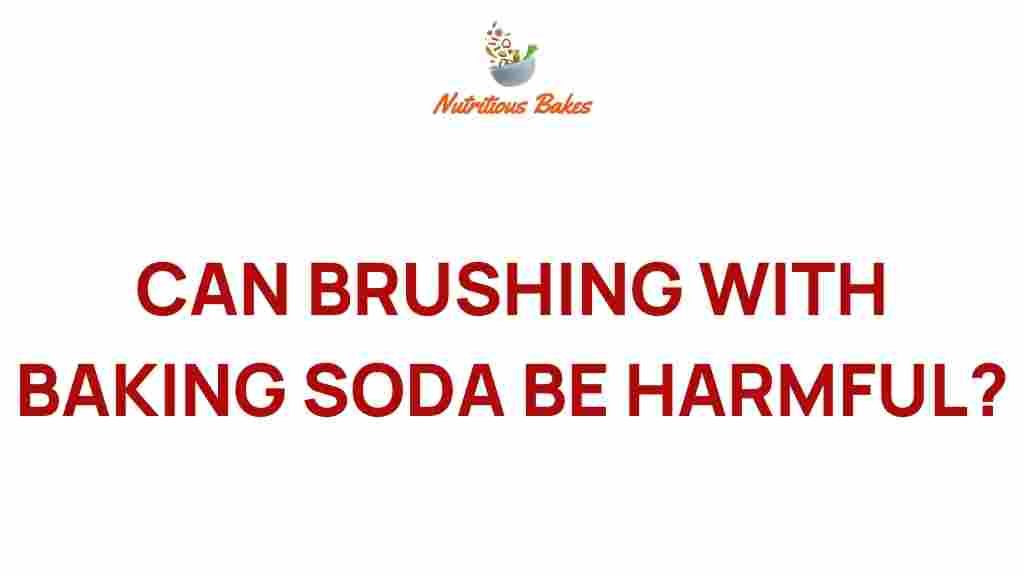The Hidden Dangers of Baking Soda: Is Your Smile at Risk?
Baking soda, often hailed as a miracle ingredient in many households, is commonly used for various purposes, from baking to cleaning. However, when it comes to dental health, the use of baking soda can be a double-edged sword. While it is frequently promoted as a natural teeth whitening agent, there are hidden dangers associated with its use that can jeopardize your oral hygiene and overall dental care. In this article, we will explore the risks, safety, and proper use of baking soda in relation to your dental health.
Understanding Baking Soda
Baking soda, scientifically known as sodium bicarbonate, is a white crystalline powder that can neutralize acids. This property has made it popular in various applications, including cooking, cleaning, and even as a remedy for certain health issues. However, when it comes to our teeth, its abrasive nature can lead to unintended consequences.
The Role of Baking Soda in Teeth Whitening
Many people turn to baking soda for teeth whitening due to its ability to scrub away surface stains. When mixed with water or other substances, it can create a paste that is used to brush teeth. However, while it may provide a brighter smile in the short term, there are significant risks to consider.
Risks of Using Baking Soda on Your Teeth
Using baking soda for oral hygiene comes with several risks that can adversely affect your dental health:
- Enamel Erosion: Baking soda is abrasive, and over time, it can wear down tooth enamel, the protective outer layer of your teeth. Once enamel is lost, it cannot be regenerated, leading to increased sensitivity and a higher risk of cavities.
- Gum Irritation: The abrasive nature of baking soda can also irritate the gums, leading to inflammation and discomfort. This can exacerbate existing gum issues or create new problems.
- pH Imbalance: While baking soda can neutralize acids, excessive use may lead to an imbalance in the oral pH, affecting the overall health of your mouth.
- Staining: Ironically, while baking soda can remove some stains, excessive scrubbing can lead to micro-abrasions that may make your teeth more susceptible to new stains.
How to Use Baking Soda Safely for Dental Care
If you decide to incorporate baking soda into your oral hygiene routine, here are some guidelines to minimize risks:
- Limit Frequency: Use baking soda sparingly, perhaps once a week, rather than daily. This will help reduce the risk of enamel erosion.
- Mix with Other Ingredients: Combine baking soda with less abrasive substances, such as coconut oil or water, to create a gentler paste.
- Monitor Sensitivity: Pay attention to any changes in sensitivity or discomfort in your teeth and gums. If you notice any issues, discontinue use immediately.
- Consult Your Dentist: Always consult your dentist before starting any new dental care regimen, especially one involving abrasive substances like baking soda.
Step-by-Step Guide to Using Baking Soda for Teeth Whitening
If you choose to use baking soda for teeth whitening, follow these steps to do so safely:
- Gather Your Materials: You will need baking soda, a small bowl, a toothbrush, and water.
- Create a Paste: In the bowl, mix one tablespoon of baking soda with a few drops of water until it forms a paste.
- Apply the Paste: Using your toothbrush, apply the baking soda paste to your teeth gently. Avoid scrubbing aggressively.
- Brush for a Short Duration: Brush your teeth with the paste for no more than two minutes.
- Rinse Thoroughly: Rinse your mouth thoroughly with water to remove any residue.
Alternative Teeth Whitening Methods
If you are concerned about the risks associated with baking soda, consider these safer alternatives for teeth whitening:
- Whitening Toothpaste: Many commercial whitening toothpastes are formulated to be less abrasive while effectively removing stains.
- Professional Treatments: Consult your dentist for professional whitening treatments that are safe and effective.
- Natural Remedies: Some natural remedies, such as oil pulling with coconut oil or using activated charcoal, may be effective without the same risks.
Troubleshooting Tips for Baking Soda Use
If you experience any issues while using baking soda, consider the following troubleshooting tips:
- Increase Hydration: Ensure you are drinking enough water to maintain oral hydration, which can help minimize sensitivity.
- Switch Products: If you notice irritation or discomfort, switch to a gentler toothpaste or stop using baking soda altogether.
- Check Your Technique: Review your brushing technique to ensure you are not applying excessive pressure while using baking soda.
Conclusion
Baking soda can be a useful tool in your dental care arsenal, but it is essential to use it wisely and sparingly. The risks associated with its abrasive nature can outweigh the benefits if not managed properly. Prioritize your dental health by consulting with your dentist and considering safer alternatives for teeth whitening and oral hygiene. Remember, maintaining a healthy smile requires a balanced approach to dental care.
For more information on safe dental practices, visit this helpful resource.
If you want to learn more about maintaining your oral hygiene, check out our article on effective dental care tips.
This article is in the category Tips and created by NutritiousBakes Team
